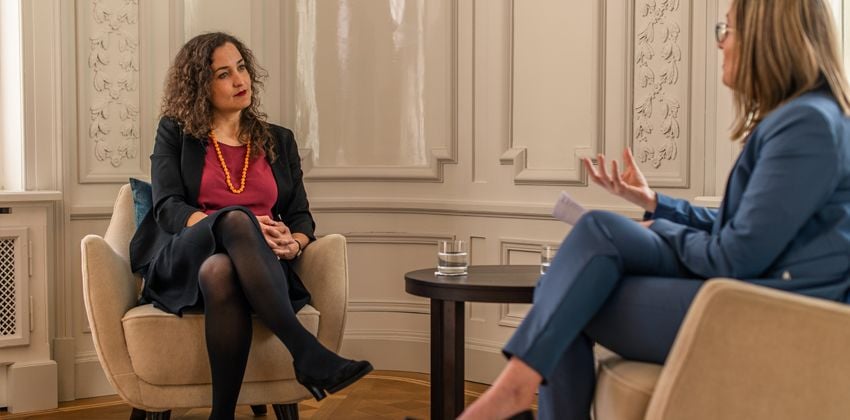The Learning Societies portfolio is one of three work portfolios the Jacobs Foundation launched in connection with the new 2030 Strategy. Over the next ten years each portfolio will contribute to the Foundation’s systematic theory of change. Irina Hotz, Co-Lead of the Learning Societies portfolio, discusses with us what a learning society is and how she is working to connect evidence to action to systems for global impact.
What is a learning society?
A learning society is an ecosystem of stakeholders from diverse backgrounds and contexts like politics, administration, civil society, business, practitioners, and parents. All of these individuals and organizations are linked by a common purpose and work together towards that purpose in a dynamic and trustful way.
“Our common purpose is clear: we want to enable children to develop their full potential through learning.”
But one of the key challenges is how to align all stakeholders so that they offer solutions that have the maximum and longest-lasting impact. We have observed that, while everybody is well-intentioned and has specific goals, oftentimes work happens in parallel or is somewhat misaligned.
How do you go about aligning stakeholders?
We aim to shape the ecosystems we are active in through facilitation, knowledge and catalytic funding. It’s about finding the sweet spot and common denominator that allows various stakeholder groups to come together. I believe we are a uniquely placed societal actor because we are held to different economic and political accountabilities than for example companies and political leaders. This means we can take actions or make investments where other organizations can not or will not go, but where we feel it would create a shift and help trigger partnerships and alliances that might otherwise not materialize.
At its core, the Jacobs Foundation is a learning organization, and rooted in the history of the Foundation is the idea of connecting evidence to action, and action to systems to affect learning. We can shift what we know works into action and transform it sustainably through the systems. These systems are the processes in the societies we work in. This vision of how we work to create sustainable and impactful change is set out in our Strategy 2030.

Can you tell us more about what it means to connect evidence to action, and action to systems?
To make sustainable and impactful change so all children have the opportunity to thrive, we need to clearly understand the context, realities, and difficulties they face. That all starts with understanding of the system by asking ourselves several questions: what are the key challenges? What do we know? More importantly, what do we know works and what doesn’t? Who are the key actors within the system and how do they interrelate? What are key motives and barriers to change? Understanding the landscape through available evidence, research and best practices, and generating data and knowledge where there are gaps, informs us where we can make investments for the greatest long-term impact.
Research we know often works only in very specific, almost sterile environments. It also doesn’t always find its way into practice as it is not available, relevant, applicable or understood by practitioners.
“Research needs to be translated into real-life contexts so it works within the complexities and challenges of real people and places.“
In connecting evidence to action, we can work together with the actors within the system to create sustainable and impactful change. This means we work to improve and change the critical components of a system. Our work can inspire changes in practice, kick off change management processes, and/or gradually transform leadership approaches to improve entire systems. This Theory of Change is our key navigation tool.
What would the system look like when it is functioning at its best?
We don’t know yet exactly and it’s likely to differ across contexts. What we do know is that efforts so far have not been as effective as we hope and we’re not the only ones that think that way. There is so much potential to further improve and develop the societies we live in. We need to ask ourselves: How can societies learn from each other? What kind of best practice is out there? Which leaders have made a real difference? I think mutual understanding, collaboration and sharing will be strong drivers of the change we would like to see.
The Jacobs Foundation is working to achieve global impact. How can systems change be replicated when societies culturally, economically and geographically differ?
We are aiming to achieve both global and very localized impact. Every context is different with its own realities, dynamics, beliefs and behaviors. Over the past years, specifically through our work in Switzerland and Côte d’Ivoire.
“We have realized how important it is to focus efforts to create lasting change within a specific system.“
We have therefore chosen to continue our global work but also selected Switzerland, Côte d’Ivoire, and Ghana as core countries for an in-depth approach. A fourth country will be announced subsequently. These countries have different cultural, economic, political, and religious environments and its this diversity that will allow us to learn across systems and hopefully to develop model approaches and processes that can be scaled globally or scaled in similar contexts.
We believe through sharing and collaboration, there is also an inspirational piece which is the very core of our work and accompanies us throughout our journey to help children thrive.
